Cold Hell (DIR. Stefan Ruzowitzky)
Cold Hell is a dark and gritty crime thriller written by Martin Ambrosch and directed by Stefan Ruzowitzky. The film has been deservedly compared to other serial-killer thrillers like David Fincher’s Se7en; though it doesn’t revolutionize the genre, Cold Hell’s adrenaline-fuelled brutality prove that following the usual formula isn’t always a bad thing.
Violetta Schurawlow (Head Full of Honey) delivers a remarkable performance as Özge, a tough and resourceful taxi driver. When she isn’t driving people around the streets of Vienna, Özge spends her time kicking ass in the boxing ring – until her next-door neighbour is savagely murdered by a serial killer and Özge catches a glimpse of the murderer.
Schurawlow brings a raw energy to the screen that is difficult to ignore. Without her, Cold Hell would be little more than a middling thriller with a healthy dose of thinly veiled political commentary. But in Schurawlow’s hands, Özge becomes one of the most charismatic female protagonists that I have ever seen on screen. Her rage is real. It is the rage that women all over the world feel every day in the face of harassment, sexism, and violence: it is quiet, rarely verbally articulated, but ever-present. One of the film’s strengths is that it doesn’t hesitate to show Özge’s strength at the same time that it shows her capacity for compassion without ever relying on the usual clichés or tropes of “caring” and “warm” female characters to do so.
Schurawlow’s performance is certainly not the film’s only strength. Cold Hell offers fast and gritty action sequences that will induce a rush of adrenaline in even the most jaded audiences. There are also a few wonderfully suspenseful moments. Ruzowitzky, who won a best foreign language Oscar in 2008 for his film The Counterfeiters, is an undeniable master of pacing and tension.
While Cold Hell doesn’t reinvent the wheel when it comes to the thriller genre, it does offer a tightly constructed narrative and a fierce energy that proves that sometimes playing by the rules can work – especially when you are an expert at the game.
– Shannon Page
**********
Eat Locals (DIR. Jason Flemyng)
Jason Flemyng’s directorial debut, Eat Locals, is a horror comedy with all the right ingredients that doesn’t quite live up to its potential.
In a sleepy British village, eight vampire overlords gather – as they do every fifty years – to discuss bureaucratic issues such as territorial disputes and feeding quotas. Things take an unexpected turn when the vampires learn that their meeting place has been surrounded by armed Vatican forces, set on eliminating them permanently.
Eat Locals certainly doesn’t suffer from a lack of on-screen talent and certainly offers a handful of genuinely funny moments, particularly in its strong first act. The film features a cast of prominent UK actors like Freema Agyeman (BBC’s Doctor Who and Netflix’s Sense 8), Eve Myles (BBC’s Torchwood), Mackenzie Crook (Game of Thrones, The Office (UK), the Pirates of the Caribbean franchise), Dexter Fletcher (Lock, Stock and Two Smoking Barrels) and Charlie Cox (Netflix’s Daredevil).
While there is some excellent physical comedy, especially from Billy Cook (Traveller, Trespass Against Us) who plays the hapless young human one of the vampires has brought along with her in the hope of having him join their vampire “family”, it is difficult to overlook Eat Locals’ rough edges. This is clearly a low-budget comedy, and it shows. There are plenty of films that manage to do miraculous things on a shoe-string, but the cringe-worthy special effects clearly show that Eat Locals has spread itself a bit too thin.
The beginning of the film pays homage to classic vampire tales, particularly Bram Stoker’s novel Dracula. This is one of the few, perhaps the only, contemporary vampire film I’ve seen that references the traditional connection between the vampire and xenophobia. In most of the first vampire literature, the vampire is a foreign monster that invades or threatens Britain. Eat Locals demonstrates an awareness of these genre origins and offers what could have been a smart twist on tradition: these vampires aren’t mysterious monsters from beyond the border, they are decidedly home-grown. Regrettably, the film doesn’t follow through with this idea and the us/them dichotomy is limited to the conflict between the living and the undead. It feels like a missed opportunity, especially given the current political and social context in the United Kingdom in the wake of the decision to leave the European Union. A sharper, braver, film would have gone for the throat and more overtly embraced the rich socio-political metaphor that was there for the taking.
Ultimately, Eat Locals isn’t a bad film; it just doesn’t quite live up to the precedent that has been set by previous films, notably 2014’s What We Do in the Shadows, that have done the same kind of thing with far more flare.
– Shannon Page
**********
The Endless (DIR. Justin Benson, Aaron Moorhead)
Justin Benson and Aaron Moorhead’s The Endless follows two brothers, played by Moorhead and Benson, who grew up on a strange, cult-like retreat in the Californian wilderness. Nearly ten years after leaving, the brothers return to the camp after receiving a strange video message, only to discover that the goings-on may be even more strange than they remember.
Simply put, this is a refreshingly original and beautifully strange film. The cinematography is excellent; every shot is deliberate and thoughtful. It is surprisingly rare to find a film that seems so committed to having each piece of the whole fit together with perfect precision. The reoccurring insect imagery, for example, is a nice touch that works on a thematic level while also contributing to a feeling of uneasiness.
Benson and Moorhead also prove that they are just as capable in front of the camera as they are behind it – both deliver solid performances. The sibling banter between the brothers is quick and funny, making the characters almost instantly appealing and relatable – even if their life circumstances aren’t. The mystery surrounding the retreat unfolds slowly, and it’s certainly worth the wait. Events go from weird to utterly mind-bending, but not so quickly that the audience is left behind along the way. Throughout the story, the brothers – and their relationship – acts as an anchor that keeps the film grounded, human, and real.
The Endless has been doing well on the festival circuit this year, having won awards at both the Neuchâtel International Fantastic Film Festival and the Bucheon International Fantastic Film Festival. The honours are well deserved; not only is the film a sharply written, and beautifully shot, psychological thriller, it is also a thoughtful meditation on family and sibling relationships.
– Shannon Page
**********
Lowlife (DIR. Ryan Prows)
Directed by Ryan Prows, Lowlife is a bizarre and gruesome drama that follows in the footsteps of Quentin Tarantino’s masterpiece, Pulp Fiction. The film tells the story of an organ-harvesting scheme that goes awry through the perspectives of a recovering addict, an ex-con, an accountant, and a luchador. The events are presented out of chronological order, with each segment of the film showing the same day from a different character’s point of view.
Lowlife is dark, bloody, and raw. Set in southern California somewhere near the Mexican boarder, the film makes excellent use of its setting – contrasting the sunshine and palm tree-lined suburban streets with the grim and dimly-lit underground spaces where human trafficking, prostitution and murder are common place.
The characters are quirky, but remain refreshingly relatable and human. The film features a talented cast including Nicki Micheaux (Six Feet Under), Santana Dempsey (Dear White People), and Mark Burnham who delivers a delightfully repulsive performance as an organ-harvesting pimp with a taste for tacky shirts. In a film full of impressive acting, the stand out is Ricardo Adam Zarate as the luchador “El Monstruo”. His character is sympathetic, humorous, and aggressively original.
For all its violence and grit, Lowlife is funnier and more heartwarming than it has any right to be. Even when it is at its most brutal, the film never seems to take itself too seriously, or allow itself to become too farcical either. The weirdness is punctuated by moments that are emotional and moving. It takes skill and restraint to combine humour, drama, and bloody action into one package without the transitions feeling choppy or uneven, but Lowlife makes the fusion seem almost effortless.
This film certainly isn’t for everyone, but audiences that enjoy outside-the-box filmmaking and Tarantino will find a lot to love.
– Shannon Page
**********
For more information on the festival, visit the official Toronto After Dark website.
Do You Tweet? Follow These Tweeple:
Toronto After Dark: @TADFilmFest
Shannon Page: @ShannonEvePage
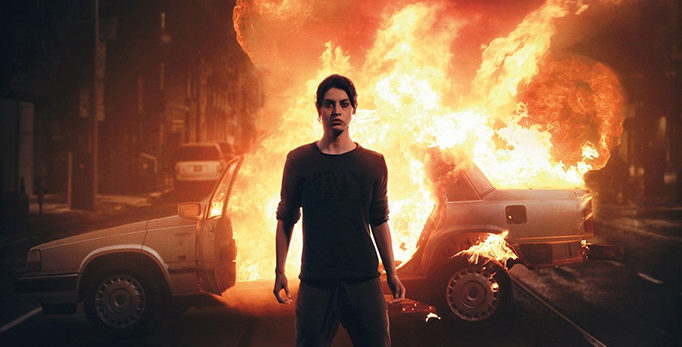


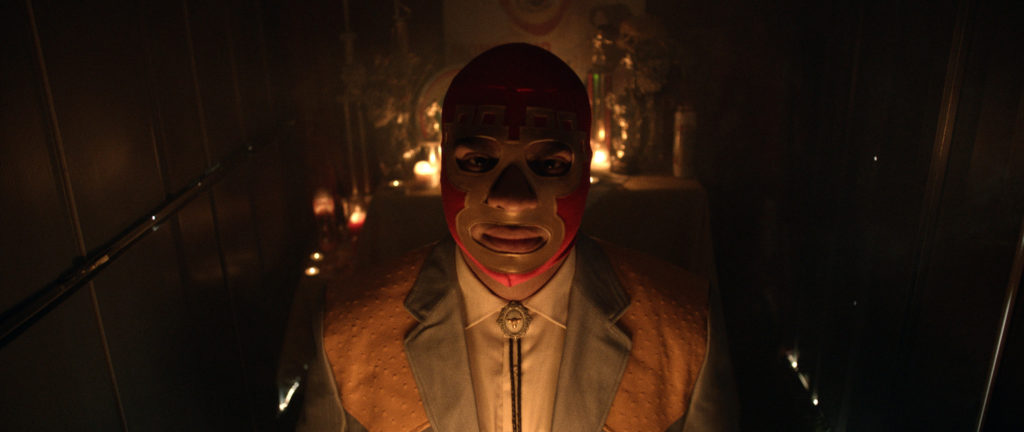
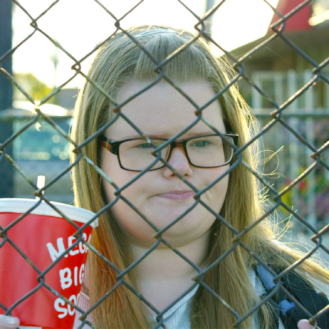

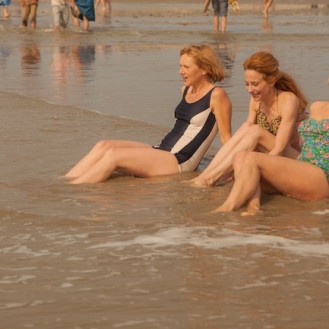
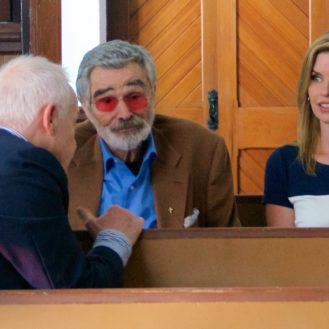
Be the first to comment